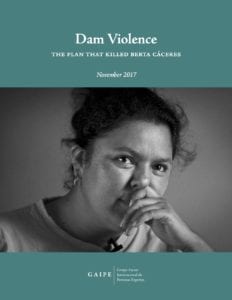On March 2, 2016, armed persons stormed into the home of human rights defender Berta Cáceres, shot her dead, and injured Gustavo Castro Soto, a Mexican national. Before her death, Berta had mobilized indigenous Lenca communities in a grassroots campaign that prompted the world’s largest dam builder to withdraw from the Agua Zarca Dam project – one of dozens of dam projects approved by the Honduran government on Lenca land. In response to her activism over the years, Berta had achieved international acclaim and become the target of death threats and the victim of physical attacks and legal persecution.
Immediately after the murder, the Cáceres family called for an independent investigation of the crime by international experts. The Honduran government, however, refused to reach an agreement with the Inter-American Commission on Human Rights to authorize an international investigation.
In 2016, the International Expert Advisory Panel (GAIPE) was created at the request of the Cáceres family and with the support of national and international civil society organizations. GAIPE’s mandate is to carry out an impartial and independent examination of the criminal investigation, conduct an analysis of the context in which the attacks occurred, and issue recommendations.
GAIPE has conducted several on-site visits to Honduras; interviewed more than thirty individuals, analyzed different reports by human rights experts and advocacy groups; and reviewed court records in ten criminal cases related to in the Agua Zarca Project. GAIPE has also had access to part of the criminal investigation conducted by Honduran authorities of Berta Isabel Cáceres’ murder and over 40,000 pages of call logs as well as chats, texts, GPS, emails, and images extracted from the phones of persons implicated in the murder.
On October 31, 2017, GAIPE released its findings and recommendations. GAIPE found that a criminal network comprised of DESA executives and employees, state agents, and hitmen are responsible for killing Berta Cáceres and committing a range of other crimes such as unlawful association, conspiracy, obstruction of justice, and abuse of authority.
Although eight individuals have been indicted for the murder, including an active member of the military, the social and environment manager for the company, and DESA’s former director of security, Honduran investigators have failed to pursue who ordered and financed the crime. GAIPE found that the Public Ministry has had sufficient evidence to bring company executives into custody for the murder and other crimes since May 2016, but has failed to act.
GAIPE also found the decision by international financial institutions – the FMO, Finnfund and the Central American Bank for Economic Integration – to finance the Agua Zarca Project disregarded the right of indigenous communities to free, prior, and informed consultation as well as the acts of violence and intimidation committed by DESA and state security forces.
Based on its findings, GAIPE recommends that Honduras revoke the concession, licenses, and permits for the Agua Zarca Dam; the Public Ministry dismantle the criminal network responsible for Berta Caceres’ murder and other crimes by conducting an exhaustive investigation that leads to the prosecution and punishment of the intellectual and material authors; and international financial institutions should release all information related to acts of violence and intimidation by DESA and implement effective policies to protect critics and opponents of development projects from reprisals.
Dam Violence: The Plan That Killed Berta Cáceres, GAIPE, 2017
Represa de Violencia: El Plan Que Asesinó Bertha Cáceres, GAIPE, 2017
Inside the Plot to Murder Honduran Activist Berta Caceres, The Intercept, 2019
Who Ordered Killing of Honduran Activist? Evidence of Broad Plot Is Found, New York Times, 2017
Honduras arrests ‘mastermind’ behind Berta Caceres’ murder, Al Jazeera, 2018
Murder of Berta Caceres part of calculated plot: report, Al Jazeera, 2017
Honduras arrests alleged mastermind behind activist’s murder, Reuters, 2018.
Nobel laureates demand justice for slain Honduran activist Berta Caceres, Reuters, 2017,
Hydro Electric Firm, Honduran Military Planned Berta Caceres Murder, Telesur, 2017.
Environmentalist’s murder a criminal plot, new report says, CNN, 2017.
Murder of Berta Caceres part of coordinated plot: lawyer team, Al Jazeera, 2017.
BBC World Service Newshour Interview, BBC, 2017.
Clinic Plays Key Role in Investigation of Death of Honduran Activist, Berkeley Law, 2017.
The Honduran Candidate, New York Times, 2017.
Berta Cáceres murder: ex-Honduran military intelligence officer arrested, The Guardian, 2018.
